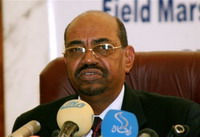USA: janjaweed militia in Darfur is supported by Sudan's government

One of the most toughest accusations came from Washington: a top official said on Monday that the janjaweed militia which is blamed for atrocities in Darfur is actively supported by the Sudan’s government.
Sudan's government has always denied backing the janjaweed, despite accusations that it does so from the United Nations, the African Union and the International Criminal Court.
Speaking at the end of a three-day visit to Sudan, Deputy Secretary of State John Negroponte told reporters that Sudan faced "continued and possibly even intensified international isolation" if it did not move quickly to implement a UN plan for revamping the African Union peacekeeping operation in Darfur, improve access for aid agencies there, and beef up the region's transitional authority.
He also said the government must clamp down on the janjaweed, a pro-government militia blamed for numerous cases of killing, rape, arson and looting in the western Sudanese region that has been wracked by rebellion and counter-insurgency for the past four years.
"The government of Sudan must disarm the janjaweed, the Arab militias that we all know could not exist without the Sudanese government's active support," Negroponte said.
Sudanese President Omar al-Bashir has described the janjaweed as "bandits," but members of the militia have told the media they were armed by the government. And the International Criminal Court has accused a junior Cabinet minister of being the paymaster of the janjaweed and a member of the Sudanese security forces of being one of its leaders - charges that Khartoum denied.
Negroponte added that those rebel forces that did not sign the Darfur Peace Agreement of May last year "must stop their attacks, put down their arms and come to the negotiating table."
Negroponte said there were now more refugees - people driven from their homes by the conflict - in Darfur than when the peace accord was signed. And he accused the government of hindering international efforts to help them.
"The denial of visas, the harassment of aid workers and other measures have created the impression that the government of Sudan is engaged in a deliberate campaign of intimidation," Negroponte told reporters. "When it comes to humanitarian access, the government of Sudan's record is not encouraging."
He said there had been "some stabilization in certain aspects of the humanitarian situation" in Darfur, such the rates of malnutrition and mortality, but he stressed that conditions remained "precarious" and "unpredictable."
"We must move quickly to a larger hybrid United Nations-African Union peacekeeping force with a single unified chain of command that conforms to UN standard and practices," he said.
The United Nations proposes to replace the AU force of 7,000 troops in Darfur with 22,000 UN-AU peacekeepers. It is widely recognized that the current force is inadequate to stop the fighting in a region the size of France or Texas, where about 2.5 million people have been driven from their homes.
But al-Bashir has rejected the deployment of large numbers of U.N. troops as a violation of sovereignty, saying that all the AU force requires is to be reinforced by a small contingent of UN personnel and equipment.
Negroponte said his talks with the president and other officials had been positive, but Washington's relations with Sudan would improve only when Khartoum performed better in Darfur. Sudan has complained that Washington failed to meet its expectations of better relations after it made peace with the southern Sudanese rebels in 2005.
If there were significant progress in Darfur in all fields - humanitarian, security and political - then this "could pave the way, could open the door for improvement of bilateral relations between the government of the United States and the government of Sudan," Negroponte said.
The United States has been holding off on imposing sanctions against Sudan to allow time for the government to decide to accept the U.N. plan.
Many believe President al-Bashir is resisting the deployment of large numbers of U.N. troops in Darfur because he fears they would arrest Sudanese officials suspected of war crimes in Darfur.
The deputy secretary of state spoke before flying to Chad for the next leg of a regional tour that will take him to Libya, where he is also expected to push for the U.N. plan on Darfur.
Subscribe to Pravda.Ru Telegram channel, Facebook, RSS!





